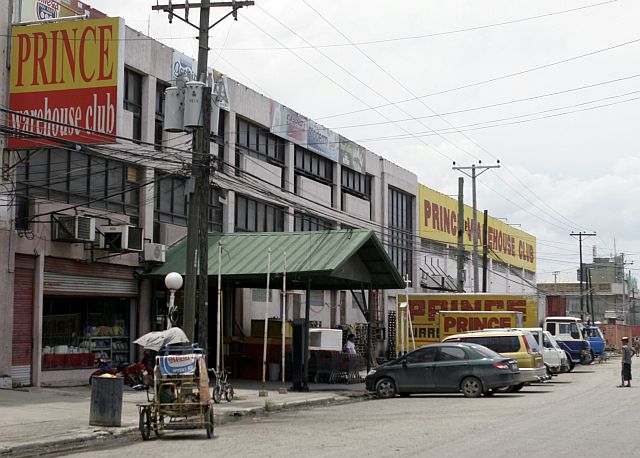
Retailers like Prince Warehouse Club owned by Robert Go favor contractualization. (CDN FILE PHOTO)
Some business leaders in Cebu are open to the move to end labor contractualization, a scheme that hires temporary workers for less than six months without benefits.
Donato Busa, president of the Mandaue Chamber of Commerce and Industry (MCCI), said he believed that workers must be given value as human beings so they deserve to get permanent jobs.
He said the scheme could be one of the reasons for the low productivity in the country.
“Ang among experience ana nila (contractual workers), kon mang-apply sila sa amoa, di sab sila magtinuod sa trabaho kay murag maghunahuna sila nga asa sila motrabaho human sa lima ka buwan (Based on experience, contractual employees are not very efficient, probably because they are worried about where they could find another job after five months),” Busa said.
Under the Labor Code, newly hired employees undergo probation for six months. Those allowed to work after six months would be considered regular employees who are entitled to basic benefits, including 13th month pay and contributions for Social Security System, Philippine Health Insurance Corp. (PhilHealth) and Home Development Mutual Fund (Pag-IBIG).
With contractualization or endo (end-of-contract), workers are contracted for only five months to prevent regularization. Contractual workers are not entitled to benefits.
Busa said, however, that there should be a consultation with the business sector before this is implemented because a lot of companies would be affected by the abolition of contractualization.
Gordon Alan Joseph, president of Cebu Business Club, also said he was amenable to scrapping the scheme but said the Labor Code should be amended to protect employers who have to terminate dishonest and inefficient employees.
He said employers usually end up facing labor cases even if the employees they fired were dishonest and inefficient.
“I am for ending contractual hiring as all employees should be honestly paid and well-trained to achieve their true potential and to help in a company’s growth,” he said.
“But we need to also amend the laws relating to termination of employees for cause. At present it is extremely difficult to terminate incompetent and dishonest employees and these are real issues for businessmen. Many businesses do contractual hiring simply to facilitate the replacement of employees for cause,” Joseph said in an online interview.
He said even foreign investors have raised concerns over the country’s labor laws, some of which have deterred investments.
“They call it the ‘hiring and firing laws’ in the Philippines. Terminating anyone is a long-drawn, expensive exercise that increases labor costs,” Joseph said.
Carlos Co, former president of Cebu Chamber of Commerce and Industry, also said the law should be amended to give employers two to three years to assess an employee whether he or see has the required skills for the jobs and should be regularized.
Labor contractualization has become an election issue, with all five presidential candidates declaring during the last presidential debate on Sunday that they were in favor of scrapping the scheme.
But retailers, whose employees are mostly contractual, are against moves to end contractualization.
Robert Go, president of Philippine Retailers Association Cebu chapter and owner of Prince Warehouse Club, said contractualization is good for Third World countries such as the Philippines because it provides opportunities for unskilled workers to land jobs.
Go said many of new graduates find it hard to get a job and are unemployed for years because they do not have the required skills.
He noted that some graduates, regardless of the course they completed, end up working as service crew of fastfood outlets and restaurants. Some are hired as cashiers or sales ladies in department stores and groceries.
“They are contractual but they have jobs. They are employed and earn minimum wage. They are happy,” Go said in a text message.
Go said if contractualization will be stopped, companies will make sure they hire efficient and skilled employees and because of stringent hiring, non-skilled workers can never land jobs. This will cause unemployment to soar and the country’s economy to slow down, resulting in fewer jobs.
“It’s employment opportunity that will suffer. The skilled ones are OFWs (overseas Filipino workers) and (those with) good command of English go to call centers.
Our new graduates would have difficulty finding jobs and non-graduates would have to go back to rural work,” he added.
He warned presidential candidates Grace Poe, Miriam Santiago, Jejomar Binay, Rodrigo Duterte and Manuel Roxas II: “Stop it (contractualization and see the employment (rate) dip.”
“They will have to choose between no jobs for many or a scheme that is popular. When hunger strikes many, government would have to provide more dole-outs and a fiscal deficit will occur,” Go said.
Melanie Ng, CCCI president, said they would respect government officials’ decision to end contractualization, but this should be done gradually and only after consultation with the employers.
“We have to abide by the law, but I’m sure it won’t be drastic, I hope they will be able to address the issues and concerns,” Ng said.